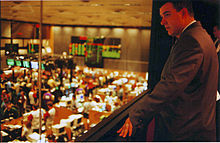RE:Don't believe everything you hear....This scenario look pretty close to a story wich you can found on Wikipedia, whicj story append in Qc in 2001!!! Corrupted AMF, bif time shorting, SP drop using media, compagny cant say much to defend because they are public, media/bullboard throwing impossible story to create fear,and ultimately all the retail investor lose everything and the shorter doesnt even have to cover the position... Here's the link, and the part of the story you should take a look at!! : https://en.wikipedia.org/wiki/Beno%C3%AEt_Lalibert%C3%A9
Controversy[edit]
JITEC was growing rapidly; its stock had jumped from CDN$3.80 in late July 2000 to CDN$11.65 in only a few weeks. This sudden success caught the attention of many, including multi-millionaire Herbert Black, who then became a friend and advisor to Laliberté. However, unbeknownst to Laliberté, Black had a well established history of profiting from the short selling of companies’ stocks. Soon after becoming involved with Laliberté, Black allegedly began this process with JITEC. He reported Laliberté to the Quebec Security Commission (QSC) and accused him of insider trading and irregular transactions. He put immense pressure on the QSC to have a cease trade order issued against JITEC, which triggered an investigation. Meanwhile, JITEC stock was falling rapidly based on leaked information to the media. On Nov 10th, 2000, Paul Trudeau, principal investigator for the QSC in the case signed an affidavit required for the QSC to issue a personal cease trade order on Laliberté and an investigation was initiated. This resulted in his forced resignation as CEO the following day, the same day that Black had initiated a class action suit against JITEC, CIBC, Canaccord, and Laliberté himself for losses incurred with the drop in share price. However, at the same time Black was shorting the stock at $10 thereby benefitting from the stock's drop. In 2011, after conducting an extensive investigation, the CIBC filed as part of its defence, that Black himself alone was responsible for the drop in share price.

July 2000: Benoit Laliberté at The Montreal Stock Exchange on JITEC's first day of trading.
A small article in the Journal de Montréal in 2002 reported that Paul Trudeau, the QSC investigator, was reinstated after being arrested and subsequently fired for receiving a bribe of $1,000 from Herbert Black in 2000. Black, who had not disclosed to Trudeau the personal interests he had in the fall of the stock price, was revealed to have shorted the stock of JITEC through insider trading with privileged information. He had apparently manipulated the Commission des Valeurs Mobilières du Québec (CVMQ- now the Authorité des Marchés Financiers, AMF) in hopes of profiting from the downfall of the JITEC stock: he was short selling stocks while informing other investors of alleged irregularities in order to decrease its price (Black had been previously linked to a Commodity Futures Trading Commission lawyer and investigator, Dennis O'Keefe who was disbarred in 2005 based on conflict of interest charges from his 1995 investigation of Sumitomo Corp. for copper price fixing which resulted in a $150 million settlement in 1998). Black denied these allegations. When this was brought to the attention of Laliberté, he immediately filed a lawsuit against the QSC for a record-breaking $127 million in November 2003 on the basis that the QSC was complicent with Black in the demise of JITEC . It was later revealed that Laurent Lemieux, another senior QSC investigator involved in the JITEC case had leaked information on the investigation to the press and was also fired. In what some have viewed as retaliatory, subsequent to Laliberte launching the lawsuit the QSC initiated actions on securities infractions.
In October 2004, Laliberté was assessed by the Ministry of Revenue of Quebec for over $25 million in taxes which is still under appeal. After that, he was charged with a total of 48 counts related to securities infractions with a possible fine of $1.8 million. In February 2008, he was found guilty in Quebec Superior Court on 41 of the 48 counts and given a fine of $900 thousand. 33 of these were for late filing offenses. Laliberté appealed the fines and the trial is currently being reviewed by the Supreme Court of Canada because of the ambiguous nature of the wording of the law. In 2009 Laliberté dropped his suit against the QSC.
The entire affair has been widely reported in Canadian media. On September 23 2013, the Montreal newspaper Presse'>a> published an article on Laliberte, which chronicled his business life since 2000.